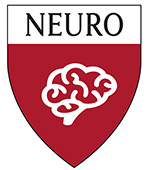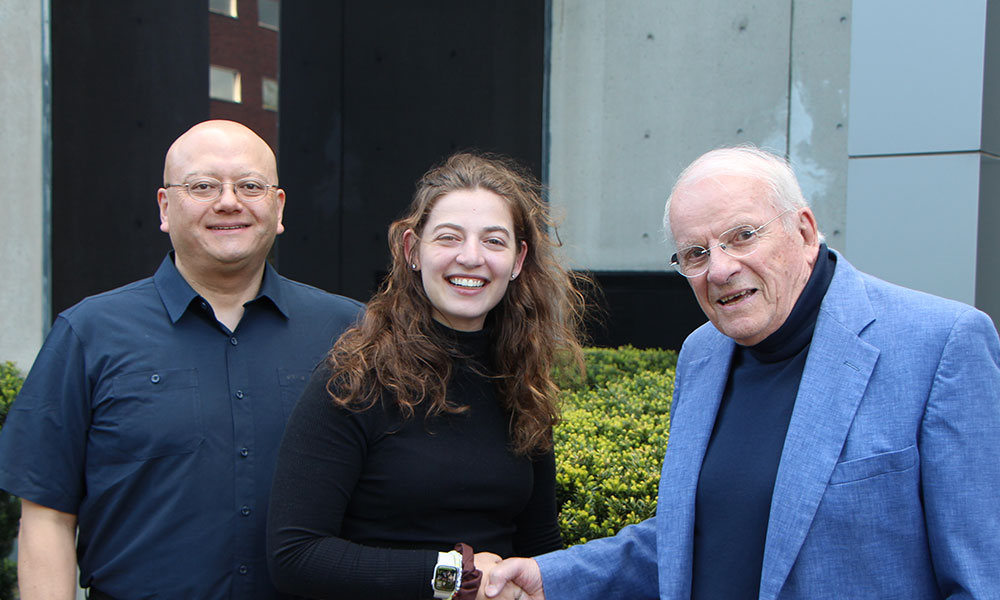Neuroscience concentrator Jessica Leff received the John E. Dowling Thesis Prize. Named for MCB professor John Dowling, the prize honors excellence in neuroscience research and undergraduate thesis writing.
“I’m so honored to receive the Dowling Prize – I honestly was not expecting it at all!” Leff says. “I think my jaw actually dropped when I heard my name called at the Neuro Thesis Awards night. I would love to thank my PI Dr. Takao Hensch, my postdoctoral mentor Dr. Saad Hannan, and all the members of the Hensch and Fagiolini labs for helping me build my confidence in research. Finally, thank you so much to my friends and family for being there for me during the highs and lows of this thesis process. I couldn’t have done it without you all!”
Leff’s thesis, titled “VIP: A Very Important Peptide in Regulating Adult Neuroplasticity,” identified a new role for a compound called vasoactive intestinal peptide (VIP) in the brain. She found that VIP regulates neuroplasticity by altering structures called “perineuronal nets” or PNNs. During critical periods, when neuroplasticity is wide open, there are few PNNs in the brain. But after the critical period ends, PNNs form around certain types of inhibitory neurons, closing down the brain’s plasticity. Leff found that stimulating VIP-producing neurons led to breakdown of the PNNs and increased neuroplasticity. The results connect VIP-producing neurons to the gamma (γ) oscillations in the brain associated with critical periods.
Identifying the new role for VIP could shed light on neurological disorders. “Throughout my experience at Harvard, my interests in neuroscience have grown alongside my passion for mental health,” Leff says. “The subject of neuroplasticity is extremely relevant within this intersection, and my thesis allowed me to focus on the neurobiological aspects that might hopefully inform our understanding of psychiatric disorders down the line.”
“I was very happy for Jess as the project involved a substantial amount of work and she thoroughly deserves the prize,” says Leff’s postdoc mentor Saad Hannan of the Hensch Lab, whose research also focuses on inhibitory neurons. “Jess was able to show bidirectional modulation of perineuronal nets by VIP activity. She extended these studies by probing mechanisms involved in the process implicating key immune cells in the brain. This is new and has important implications for opening neuroplasticity in adulthood as well as in pathological states. The thesis is also rich in terms of the breadth of experimental approaches that were employed.”
“For a newcomer to wet biology to make a major discovery that changes the way we think about how the brain works is remarkable,” says MCB faculty and Leff’s thesis adviser Takao Hensch. “Jess found a novel role for a circuit signaling mechanism that controls adult neuroplasticity, which has immediate implications for clinical application and understanding.”
Conducting these extensive experiments proved to be an enormous time commitment for Leff. “One of the biggest challenges was honestly the sheer amount of time I spent in the lab,” she says. “Most of my results were based on microscope images, which take time to acquire and to process. I often spent days in the lab in front of the microscope…But, in hindsight, I’m grateful for the time I invested into my research and am glad I was able to incorporate all those hours into a finished product I’m proud of!”
Faculty praised the thesis’s ambition and scope. “What impressed me about this thesis is its depth, breadth, and significance,” Dowling says. “It breaks new ground with regard to neuroplasticity, something critically important for understanding brain function and mechanisms. The thesis is beautifully written and very clear.”
Hensch is enthusiastic about Leff receiving the Dowling Prize. “Rewarding a job well done during this ‘critical period’ can have a lasting impact on a student’s career trajectory,” he says. “It did for me (as one of John’s students in Bio 25 years ago)!”
Congratulations to Jessica Leff!





